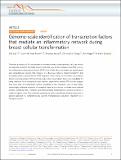Genome-scale identification of transcription factors that mediate an inflammatory network during breast cellular transformation
Author(s)
Ji, Zhe; He, Lizhi; Rotem, Asaf; Janzer, Andreas; Cheng, Christine S.; Regev, Aviv; Struhl, Kevin; ... Show more Show less
Downloads41467-018-04406-2.pdf (1.649Mb)
PUBLISHER_CC
Publisher with Creative Commons License
Creative Commons Attribution
Terms of use
Metadata
Show full item recordAbstract
Transient activation of Src oncoprotein in non-Transformed, breast epithelial cells can initiate an epigenetic switch to the stably transformed state via a positive feedback loop that involves the inflammatory transcription factors STAT3 and NF-κB. Here, we develop an experimental and computational pipeline that includes 1) a Bayesian network model (AccessTF) that accurately predicts protein-bound DNA sequence motifs based on chromatin accessibility, and 2) a scoring system (TFScore) that rank-orders transcription factors as candidates for being important for a biological process. Genetic experiments validate TFScore and suggest that more than 40 transcription factors contribute to the oncogenic state in this model. Interestingly, individual depletion of several of these factors results in similar transcriptional profiles, indicating that a complex and interconnected transcriptional network promotes a stable oncogenic state. The combined experimental and computational pipeline represents a general approach to comprehensively identify transcriptional regulators important for a biological process.
Date issued
2018-05Department
Massachusetts Institute of Technology. Department of Biology; Koch Institute for Integrative Cancer Research at MITJournal
Nature Communications
Publisher
Nature Publishing Group
Citation
Ji, Zhe et al. “Genome-Scale Identification of Transcription Factors That Mediate an Inflammatory Network During Breast Cellular Transformation.” Nature Communications 9, 1 (May 2018): 2068 © 2018 The Author(s)
Version: Final published version
ISSN
2041-1723